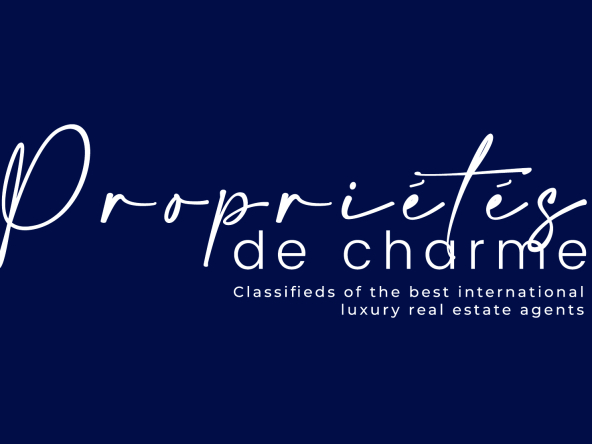Dans le monde dynamique et très concurrentiel de l'immobilier de luxe, le rôle du négociateur immobilier de luxe est crucial pour le succès des transactions. This job is both demanding, enriching and strategic, requesting a set of skills and specific knowledge. One of the essential questions that arise for any professional in the sector is: what status to choose to exercise this profession?
Dans cet article, nous allons explorer les différents statuts disponibles pour un négociateur immobilier de luxe , en analysant les avantages et les inconvénients de chaque option. Whether you are an aspiring negotiator or an experienced professional who wishes to specialize in the luxury sector, you will find here essential information to make the most suitable choice to your ambitions.
Luxury real estate: a booming sector 🌟
Luxury real estate is one of the most profitable real estate sectors. The high -end property market is constantly expanding, attracting international investors, celebrities and entrepreneurs looking for exceptional investment opportunities. This sector requires fine expertise, a solid network and, above all, perfect control of complex and often bulky transactions.
The luxury real estate negotiator plays a key role in this process. This professional intervenes in the sale, rental or purchase of prestigious real estate. Its missions are diverse, ranging from the prospecting of potential customers to the negotiation of contracts, including the evaluation of goods and the management of the relationship with customers.
However, before starting, it is crucial to choose the right legal status. This will have an impact on taxation, responsibilities, and the management of your activity.
Possible legal statutes for a luxury real estate negotiator 👩💼💼
There are several status options for a luxury real estate negotiator. Each status has its advantages and disadvantages, and the choice will depend on your personal objectives, your level of experience, as well as the financial and tax aspects that interest you. Here are the main options:
1. Independent real estate agent 🧑💼
Le statut d'agent immobilier indépendant est une option courante pour ceux qui souhaitent exercer leur activité de manière autonome, sans être rattachés à une agence ou à un réseau. As an independent, you are responsible for your own activity, which gives you great freedom of organization and management of your schedule.
Benefits :
- Total autonomy : you manage your schedule, customers and projects.
- Higher Commission : as a Indicant, you receive the entire commission on sales, unlike an employee who shares this remuneration with his employer.
- Freedom of action : You can choose the real estate you want to represent and the customers you want to work with.
Disadvantages:
- Aucune sécurité de revenu : Les revenus d'un agent immobilier indépendant sont souvent fluctuants, en fonction des ventes réalisées. This can make financial management more complex.
- Responsabilités accrues : Vous êtes seul responsable de toutes les démarches administratives, fiscales et légales liées à votre activité. This requires management skills.
2. Employee real estate agent 💼
Many real estate agencies specializing in the luxury sector offer positions of employee real estate agents. In this context, you work for the agency as an employee, often with a basic salary and commissions on sales made.
Benefits :
- Sécurité de l'emploi : Vous bénéficiez d'un salaire fixe, ce qui offre plus de stabilité financière. In addition to sales commissions, you may also be entitled to benefits.
- Less administrative responsibility : the agency generally takes care of administrative and tax tasks, allowing you to focus on negotiation and sale.
- Network and support : Working within an agency allows you to take advantage of its network, its tools and its expertise, which can facilitate the search for customers and goods.
Disadvantages:
- Less autonomy : you must follow the agency's directives, and your schedule can be less flexible than that of an independent.
- Reduced commissions : Although you benefit from a fixed salary, the commissions are often shared with the agency, which can reduce your total remuneration.
3. Real estate agent 🤝
Le mandataire immobilier est une autre option populaire dans l'immobilier de luxe. This status is between the independent and the employee agent. As a real estate agent, you work under the control of a real estate agency, but you are independent in the management of your customer portfolio and your transactions.
Benefits :
- Autonomy : You work on your own account, but you benefit from the support of the agency that recruits you.
- Interesting commissions : real estate agents receive a large part of the sales commissions.
- Administrative simplicity : The agent benefits from a more flexible legal framework, with lightened administrative formalities compared to the classic independent.
Disadvantages:
- Less stability than an employee : although you have autonomy similar to that of an independent real estate agent, you do not always have the same social protections.
- Dependence on the agency : you are attached to the agency that recruits you, and your results can be influenced by the agency's reputation.
4. Individual enterprise (IS) or EURL 🏢
Si vous souhaitez créer votre propre structure pour exercer votre activité de négociateur immobilier de luxe, le statut d' entreprise individuelle (EI) ou EURL (Entreprise Unipersonnelle à Responsabilité Limitée) peut être une option intéressante. This allows you to exercise your activity while benefiting from a limited liability.
Benefits :
- Limited liability : By opting for a EURL, you protect your personal assets from possible professional debts.
- Autonomy and flexibility : you are the only decision -maker of your activity.
- Tax optimization : This status makes it possible to optimize the tax management of your company, in particular by choosing between taxation on income or on companies.
Disadvantages:
- Administrative complexity : management of a company implies more administrative procedures, in particular accounting, tax and social declarations.
- Financial risk : if the company does not generate enough turnover, you may encounter financial difficulties.
5. Simplified joint -stock company (SAS) or SASU 💡
Si vous envisagez d'étendre vos activités à l'immobilier de luxe tout en impliquant plusieurs personnes ou associés, le statut de SAS ou SASU peut être adapté. It allows great freedom in the organization of the company.
Benefits :
- Flexibility in management : This status allows great freedom in the organization of society, with the possibility of creating shareholder pacts.
- Limited liability : shareholders are only responsible for their contributions.
- Tax and social optimization : The status allows attractive tax advantages for managers.
Disadvantages:
- Management complexity : The creation of a SAS implies writing statutes, keeping accounting, and carrying out additional administrative procedures.
- Cost of creation and operation : compared to other statutes, the creation of a SAS can be more expensive, in particular due to the costs of notary and administrative procedures.
What status to choose to become a luxury real estate negotiator? 🎯
The choice of status depends mainly on your personal situation, your professional aspirations and your desire to take risks. If you prefer the security and the advantages of employee work, a property agent position in a specialized agency may be the best option. On the other hand, if you want more autonomy and flexibility, the status of independent or agent can be more suitable.
It is essential to think carefully about your long -term objectives and the tax, social and financial benefits of each status before making a decision. In all cases, luxury real estate offers exciting prospects for those who wish to invest in this prestigious sector.
🎉 The job of luxury real estate negotiator is an exciting activity, but choosing the right status to exercise this profession is a crucial step. Depending on your priorities - employment safety, independence, or tax optimization - each status has specific advantages. Remember that success in this sector is also based on the construction of a solid professional network, the ability to understand the needs of customers and the ability to negotiate complex transactions.
Luxury real estate is an area in which success is within the reach of those who make the right choices from the start.


